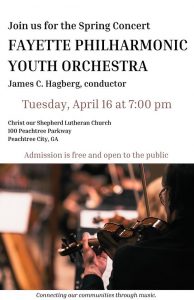When you’re a high school senior cheerleader who gets kicked off the squad after a run-in with the law, you have some choices to make.
Jules Shipe, 18, decided to become an advocate for a different kind of teenage pastime: “Party Dry.”
Legal issues during the past year resulted in the Peachtree City young woman being kicked off the varsity competition cheerleading squad at Starr’s Mill High School.
But discussions with her mom, JoAnna, and several friends about how to make something positive out of something negative led to the idea of “Party Dry,” a way for teenagers to respond to the peer pressure, even the expectation, that alcohol is a normal and accepted part of teenage years and activities.
Sitting at their kitchen table last week with Jules, JoAnna said that when she was in her teens there were more things for kids to do. But many times today when high school kids get together at a swimming pool or at a bonfire there is an added component: someone will often bring alcohol.
“It’s not the kind of peer pressure you usually think about,” JoAnna said, noting the more subtle aspect of the expectation to drink when one or more people have alcohol at a teen gathering.
It is more an unspoken type of peer pressure, Jules added, where “You walk into a party and are expected to drink because you’re a football player or a cheerleader. We’re the ones people look up to. So we want to show people that they don’t have to drink to party.”
Jules maintains that drinking is a big problem in high schools and in some middle schools in Fayette County and beyond. That acknowledgment led the friends to begin discussing the ways that underage drinking might be addressed.
So during a conversation in late August, Jules and several of her friends were discussing the former cheerleader’s legal issues and their consequence that led to her dismissal from the team.
“I don’t want this to happen to anyone else,” Jules explained, “And I didn’t want this to happen and then crawl in a hole. I wanted to be remembered, I wanted the senior class to be remembered, for something different than being the big partying class.”
It was during that conversation that the idea of partying without drinking, to Party Dry, was born.
They subsequently came up with the idea of purchasing bracelets with “Party Dry” printed on them to serve as a visible indicator of their mission and their message.
Jules and her friends did not keep the idea to themselves. They met with the youth pastor and others at Heritage Christian Church in Fayetteville.
Then several members of the Starr’s Mill football team got involved. The group ordered the bracelets, made flyers and really started talking up the idea, Jules said. And they began selling the Party Dry bracelets for $2 to cover their costs.
Jules, along with JoAnna and school quarterback Adam Holley, took the Party Dry message to a local radio show. They spoke with local representatives of the Fellowship of Christian Athletes (FCA) and got the support of the Starr’s Mill High School principal to sell bracelets at school. And with Heritage Christian they scheduled a lock-in at the church on the night of the school’s homecoming nearly two weeks ago.
The idea worked, the lock-in worked, and nearly 300 showed up at Heritage Christian for the late night alternative to drinking.
But in the mind of Jules and others involved in this impromptu movement, the lock-in was just the beginning. The group has already begun making preliminary plans for a New Year’s Party Dry event that could extend beyond the confines of the Starr’s Mill area.
Jules said kids from other schools are also beginning to inquire about having their own Party Dry events, and she hoped that other FCA groups might want to join in.
Reflecting on the use of alcohol by teenagers, JoAnna said it is not as if alcohol has never been a part of the ritualized rites of passage in the world of adolescents.
It is that, at least locally in Peachtree City and Fayetteville, some teenagers tend to participate in more alcohol-related activities during their high school years, activities that were once the domain of the college years experienced by their parents.
JoAnna maintained that on other occasions parents are sanctioning basement parties where a “Don’t ask, Don’t tell” policy is implemented, with some of these parents clearly knowing that alcohol is being consumed downstairs by underage drinkers.
All things considered, Jules Shipe could have done like most everyone else does when trouble comes and legal issues are involved: keep her head low, avoid the publicity that can lead to ridicule and do nothing. That’s the norm. But sitting at her kitchen table last week it was quickly evident that such was not the inclination of this high school senior. Jules is much stronger than the norm.
“I don’t want it to just have been a good idea,” Jules said with deliberation and a smile. “We want it to keep going because drinking isn’t what you need to be doing. Drinking can affect your life, and everything, before you know it.”
Jules’ idea of making something positive from something negative is emblematic of the simple, yet often unrecognized, reality that personal adversity of nearly any kind can be overcome if a person is willing to focus their energy and efforts in a manner that benefits others. This is how social movements are born.
And the need for such an effort as Party Dry will not be found wanting, including in Fayette County, metro Atlanta and across America.
Nearly everyone in America, in communities large and small, cannot help but be aware that the use, over-use and misuse of alcohol is pervasive and its negative effects are largely condoned by adults unless some type of injury or death is involved.
Otherwise, people joke about it and laugh, overlooking the substantial harm that so often comes from a legal drug, perhaps the preeminent gateway drug, which enjoys near universal acceptance. And through it all, the kids emulate their parent’s behavior.
At least one teenager is demonstrating a different way.












Leave a Comment
You must be logged in to post a comment.